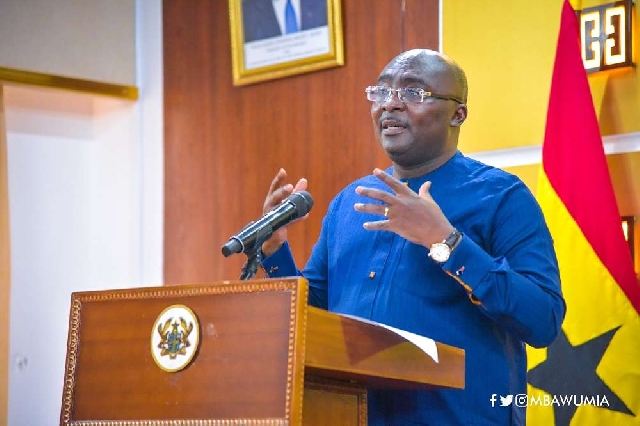Ghanacard an e-passport for diasporans’ visa-free entry into Ghana – Bawumia

Ghanaian diasporans with a Ghanacard can enter Ghana visa-free from early next year, Vice-president Mahamudu Bawumia has announced on Tuesday, 2 November 2021 during a lecture at Ashesi University on the theme: ‘Transforming an Economy Through Digitalisation – The Ghana Story’.
Dr Bawumia, who has been at the forefront of digitalising the economy since the Akufo-Addo government’s first term from 2017, told his audience: “It is not widely known that the Ghanacard is also an electronic passport (e-passport) that contains the biometric information that can be used to authenticate the identity of travellers”.
“We [the government of Ghana] have been working with the International Civil Aviation Organization (ICAO) this year to globally activate the e-passport function of the Ghanacard and I am happy to announce that on 13th October 2021, Ghana officially became the 79th member of the International Civil Aviation Organization (ICAO) Public Key Directory (PKD) community”, he said.
The ICAO Public Key Directory (PKD), he explained, is a central repository for exchanging the information required to authenticate e-passports.
The PKD allows border control authorities to confirm in less than ten seconds that the e-passport was issued by the right authority, has not been altered, and is not a copy or cloned document”, Dr Bawumia explained.
He said: “Ghana’s Country Signing Certificate Authority would therefore soon be imported into the ICAO PKD System through what is known as a Key ceremony”.
The Key Ceremony for Ghana, he announced, will be held at the ICAO headquarters in Montreal Canada hopefully by the 1st quarter of 2022.
“This means that the Ghanacard will be recognised as an e-passport and can be read and verified in all ICAO-compliant borders (in 197 countries and 44,000 airports in the world)”.
“When this happens, holders of the Ghanacard will be allowed to board any flight to Ghana”, he noted.
“Furthermore, the good news for diasporan Ghanaians is that when the Ghana Immigration Service is linked to the NIA architecture, diasporan Ghanaians who hold the Ghanacard should not have to obtain visas to travel to Ghana”, Dr Bawumia said.
“We expect this to be operational by the end of the first quarter of next year”, he said, adding: “Ghana is one of the few countries in the world where the national ID card is also an e-passport”.
He said: “The Ghanacard is also being linked with existing passports so that travel history will be preserved”.
“The Ghanacard is already valid for travel to all ECOWAS countries”.
According to him, “On coming into office, we moved quickly with the issuance of biometric national ID cards (The Ghanacard) to the population”.
The Ghanacard project, he pointed out, was initiated by former President John Kufuor “but abandoned for 8 years”.
The card, he noted, “has world-class features: It captures 10 fingerprints as well as the iris of individuals. It is also consistent with the ECOWAS standards and bears the ECOWAS logo. It is compatible with any reader which is compliant with EMV contactless communication protocol”.
So far, Dr Bawumia announced, “15.5 million people have been enrolled on the Ghanacard” by the National Identification Authority (NIA) and “most of the population will be enrolled by 2022”.
The NIA, he noted, “will open an additional 291 offices tomorrow [Wednesday, 3 November 2021] across all districts and regions to complete the exercise”, adding: “The issuance of the Ghanacard has provided Ghana with a database that will be the anchor for all transactions in the future, providing unique identity to all individuals”.
He said: “With the Ghanacard: the identity of people (even dead people) can be established using their fingerprints. Ghanaian and other embassies abroad will be able to establish the identity of Ghanaians using their fingerprints. Identity can be established even without the Ghanacard as long as you have been enrolled on the database”.
“Individuals are empowered to exercise their rights and responsibilities fairly and equitably in a modern society. Digital inclusion provides access to government services. Institutions like DVLA, Police, Banks, NHIA, Passport office, GRA, SSNIT, Telecom companies, will be able to verify the identity of anyone they are doing business with. It will make the targeting of government programs to the vulnerable and disadvantaged more effective”.
“I should note that the national ID project was executed by the NIA in collaboration with a world-class Ghanaian private sector firm, (IMS) Margins. So proud of them”.
Source: Ghana/otecfmghana.com




